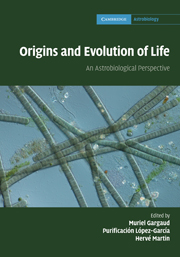Book contents
- Frontmatter
- Contents
- List of contributors
- Foreword
- Preface
- Part I What is life?
- Part II Astronomical and geophysical context of the emergence of life
- Part III The role of water in the emergence of life
- Part IV From non-living systems to life
- Part V Mechanisms for life evolution
- Part VI Life in extreme conditions
- Part VII Traces of life and biosignatures
- Part VIII Life elsewhere?
- Index
Foreword
Published online by Cambridge University Press: 04 February 2011
- Frontmatter
- Contents
- List of contributors
- Foreword
- Preface
- Part I What is life?
- Part II Astronomical and geophysical context of the emergence of life
- Part III The role of water in the emergence of life
- Part IV From non-living systems to life
- Part V Mechanisms for life evolution
- Part VI Life in extreme conditions
- Part VII Traces of life and biosignatures
- Part VIII Life elsewhere?
- Index
Summary
Astrobiology, also known as bioastronomy or exobiology, is the study of the origin, evolution and distribution of life in the Universe. These are subjects which have been of interest to mankind throughout recorded history. Although questions of origins have most frequently invoked divine beings, non-supernatural speculation on these fundamental issues dates back at least to the Ionian school of pre-Socratic Greek philosophers. Anaximander, the successor to Thales, is reported as saying that all living creatures arose from the moist element (water) through the action of the Sun (Freeman, 1966), a prescient insight given current ideas that life as we know it requires water, that radiation acting on inorganic matter can produce the molecular components of life (amino acids, nucleic acids, etc.) and that the Sun is the ultimate energy source for almost all life on Earth. In fact, Anaximander seems to have gone further and suggested that human beings arose from fish-like creatures (presumably a natural result of life having originated in water).
Speculation about life beyond the Earth has also had a long tradition. Although Pythagoras himself is not known to have recorded his teachings, his school (in particular, Philolaus, ca. 400 BCE) is said to have written that the Moon appears Earth-like because it is inhabited with animals and plants (Dreyer, 1953). At roughly the same time the atomist school of Leucippus and Democritus taught that the Universe is infinite and contains innumerable worlds.
- Type
- Chapter
- Information
- Origins and Evolution of LifeAn Astrobiological Perspective, pp. xiii - xviPublisher: Cambridge University PressPrint publication year: 2011
- 20
- Cited by

